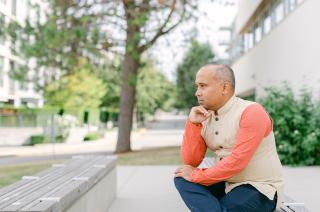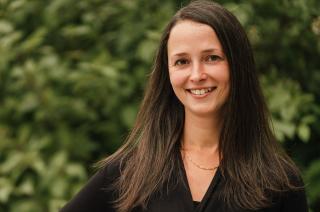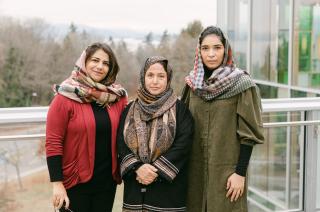
Kristen Thomasen is one of Canada’s leading experts in robotics law and policy, specializing in drone regulation and the privacy impacts of robotic technologies and artificial intelligence. In January 2021, she joined the Allard Law community as an assistant professor.
This spring, she’ll be teaching Tort Law, as well as Law, Robotics & Society, which explores the legal and policy implications of robotic and AI systems such as drones, internet bots and automated vehicles. Professor Thomasen serves on the Canadian Drone Advisory Committee, the Legal Expertise Committee of the Foundation for Responsible Robotics and on the International Committee for Robot Arms Control.
We asked Professor Thomasen to tell us more about her research and why she’s excited to be part of the Allard Law community.
What are your research interests?
My research looks at how laws can or should regulate robotic and automated technologies, and how these technologies challenge current laws and legal assumptions. Automated systems are affecting people's daily lives in a huge range of, sometimes subtle, ways. I'm especially curious about how robotic technologies will be introduced into urban public spaces, and whether this can happen in ways that are equitable. I think there is potential for some important positive uses of automation, for example, in making the built environment more accessible, or protecting the environment from negative human impacts. But with more robotic systems in public spaces, there's also a real risk of privatizing shared spaces, increasing harm to environments around the world through resource extraction to build these technologies, furthering colonial projects under the guise of innovation, and marginalizing people and communities from spaces that have important shared and social values.
My research focuses on a sliver of these challenges, especially in relation to privacy and surveillance. But it's just one small part of a much broader set of questions that don't always get prioritized where tech is driven by a 'move fast and break things' mindset. Fortunately, a lot of thoughtful people are working on highlighting and addressing these many challenges.
Tell us a bit about your current research projects.
I have a few projects on the go right now. I’m currently finishing my SSHRC-funded doctoral dissertation, which examines the personal use of robotic and AI systems, like drones and facial recognition technology, in public spaces. I argue that courts must rethink the limited application of the privacy torts in public space, in light of Charter values like privacy, equality and expression, and the kinds of interpersonal privacy harms that can be carried out through the use of these technologies.
I’m also working on an interdisciplinary project with two roboticists from the Oregon State University, Dr. Bill Smart and Dr. Cindy Grimm. We’re thinking about how roboticists and legal experts can work together in developing regulation and design of public space robots, like sidewalk delivery robots. I’m also currently part of a team working on a CIHR-funded project, in particular doing research with my colleague Dr. Bev Jacobs relating to Indigenous data sovereignty.
What do you look forward to most about being a part of the Allard community?
The Allard community has already been so welcoming and generous since my arrival at the start of the year. I am looking forward to—well, meeting everyone in person! And to hopefully engaging and collaborating on a range of topics where AI and robotics regulation is increasingly important, like municipal governance, policing and prisons, and environmental justice. I’ve already had a wonderful teaching experience this past term, and can’t wait to meet more students next year in Tort Law and Law, Robotics & Society.
I’m also excited about the possibilities for collaboration between departments at UBC, including the world-class engineering and computer science departments, both for research and for teaching opportunities for students. And I’m excited about the possibility of further partnerships along the west coast, including in Vancouver, Washington, and Oregon. The West Coast already has a thriving technology sector, and I’m excited to contribute to some of the thinking around what this means for our communities and legal systems.
Learn more about Professor Kristen Thomasen or follow her on Twitter @kristenthomasen.


